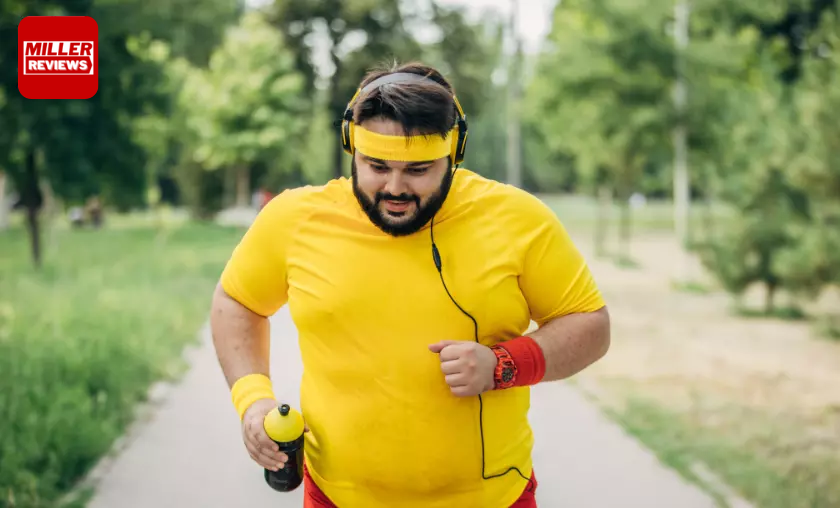There are plenty of reasons why exercise is good for your health. Regular exercise is absolutely fantastic for not only boosting your energy levels but also lifting your spirits. It’s a total powerhouse for promoting good health can help lower your chances of developing chronic diseases. Let me break it down for you: exercise involves any movement that gets those muscles working and burns up those calories.
Now, regarding to physical activity, the options are plentiful. You’ve got swimming, running, jogging, walking, and dancing, to name a handful. And let me tell you, being active has an incredible impact on both your physical & mental well-being. In fact, it may even add some extra years to your life.
Table of Contents
Hold on tight because I’m about to reveal the top 10 remarkable ways that regular exercise can work wonders for your body and mind. Get ready to be amazed!
10 Best Reasons Why Exercise Is Good For Your Health
1. Exercise Can Make You Feel Happier

Let me tell you something fascinating about exercise — it has this incredible ability to lift your spirits and dial down those feelings of depression, anxiety, and stress. I kid you not; it’s backed by solid evidence. Now, here’s the science behind it: when you exercise, it triggers changes in those clever parts of your brain that regulate stress & anxiety. On top of that, it cranks up the brain’s sensitivity to serotonin and norepinephrine, those hormones that work like superheroes in fighting off depression.
But wait, there’s more! Exercise can also seriously boost the production of endorphins—those wonderful little chemicals that generate all those feel-good vibes and can even reduce pain volume. Here’s the kicker: whether your workout is a gentle stroll or an intense sweat session doesn’t matter. Exercise can work wonders for your mood, regardless of the intensity of the physical activity.
In a group of 24 women diagnosed with depression, engaging in exercise of any intensity significantly reduced those feelings of depression. It’s pretty incredible stuff. But here’s the real eye-opener: the effects of exercise on your mood are so potent that even the decision to exercise or not can make a difference in a short span of time.
2. Exercise Can Help With Weight Loss

Let me share some eye-opening studies with you, my friend. They’ve revealed that inactivity significantly affects weight gain and obesity. But here’s the key: to truly grasp how exercise influences weight reduction, we must understand the connection between exercise and energy expenditure. It’s a vital piece of the puzzle, believe me.
Your Body Spends Energy in Three Ways:
Let’s talk about the impact of dieting on your metabolic rate, my friend. When you reduce your calorie intake, your metabolic rate takes a hit, which can temporarily slow down weight loss. But here’s the good news: regular exercise actually revs up your metabolic rate, helping you burn more calories & achieve your weight loss goals.
- Exercising
- Digesting food
- Maintaining body functions, like your heartbeat & breathing
Here’s some valuable insight, my friend: studies have revealed that you hit the jackpot when you combine aerobic exercise with resistance training. This powerful combination maximizes fat loss and helps you maintain that precious muscle mass. And let me tell you, holding onto your muscle mass is absolutely vital for keeping the weight off and maintaining a lean, toned physique.
3. Exercise is Good for Your Muscles & Bones

Let me tell you, exercise is a powerhouse when it comes to building and maintaining strong muscles and bones. When you engage in activities like weightlifting and pair them with adequate protein intake, magic happens. Exercise triggers the release of hormones that enhance your muscles’ ability to absorb amino acids, promoting growth and reducing breakdown.
And as you age, muscle loss becomes a concern. That’s why regular physical activity is a must—it helps prevent muscle loss and maintains strength as the years go by. But wait, there’s more! Exercise not only helps build bone density when you’re young but also plays a role in preventing osteoporosis later in life.
Here’s a fascinating tidbit: research suggests that high-impact exercises like gymnastics or running and odd-impact sports like soccer and basketball may be particularly effective in promoting higher bone density compared to no-impact sports like swimming and cycling.
4. Exercise Can Increase Your Energy Levels

Let me share with you about the incredible energy-boosting power of exercise, my friend. Not only does exercise work wonders for people with various medical conditions, but it can also reduce feelings of fatigue.
But wait, there’s more! The heart and lung health benefits of exercise are simply remarkable. Aerobic exercise supercharges your cardiovascular system and improves lung health, significantly boosting your energy. As you get moving, your heart pumps more blood, delivering abundant oxygen to your hardworking muscles. Regular exercise makes your heart a pro at oxygen delivery, making your muscles more efficient.
And here’s the best part: over time, this aerobic training reduces strain on your lungs, making vigorous activities less breathless and requiring less energy. But the energy-boosting effects of exercise don’t stop there. It has also been shown to increase energy levels in individuals with conditions like cancer.
5. Exercise Can Reduce Your Risk of Chronic Disease

Lack of regular physical activity is a major culprit behind chronic disease. But fear not! Regular exercise comes to the rescue. It has a slew of benefits, such as improving insulin sensitivity, heart health, and body composition while lowering blood pressure and cholesterol levels.
Let’s Dive Into the Specifics. Exercise Plays a Crucial Role in Preventing or Managing Various Chronic Conditions:
- Type 2 diabetes: Aerobic exercise delays or even prevents type 2 diabetes, benefiting both type 1 and type 2 diabetes sufferers. Resistance training for type 2 diabetes yields improvements in fat mass, blood pressure, lean body mass, insulin resistance, and glycemic control.
- Heart disease: Exercise reduces cardiovascular risk factors and serves as a therapeutic treatment for those with cardiovascular disease.
- Many cancers: Exercise lowers the risk of several cancers, including breast, colorectal, endometrial, gallbladder, kidney, lung, liver, ovarian, pancreatic, prostate, thyroid, gastric, and esophageal cancer.
- High cholesterol: Moderate-intensity physical activity boosts HDL (good) cholesterol while keeping LDL (bad) cholesterol in check. High-intensity aerobic activity may be necessary to lower LDL levels.
- Hypertension: Regular aerobic exercise lowers resting systolic blood pressure by 5-7 mmHg among individuals with hypertension.
Here’s the flip side: a lack of regular exercise, even in the short term, can lead to significant increases in belly fat, upping the risk of type 2 diabetes and heart disease. That’s precisely why engaging in regular physical activity is strongly advised. It helps reduce belly fat and decreases the likelihood of developing these conditions.
6. Exercise Can Help Skin Health

Your skin can be influenced by the level of oxidative stress in your body. Oxidative stress happens when your antioxidant defenses can’t fully repair the cell damage caused by troublesome free radicals. This damage can wreak havoc on your cell structure and leave your skin looking less than stellar.
The exciting part is that while intense and exhaustive physical activity can contribute to oxidative damage, regular moderate exercise does the opposite. It boosts your body’s production of natural antioxidants that come to the rescue and shield those precious cells. But wait, there’s more! Exercise also gets that blood flowing and prompts your skin cells to adapt in a way that keeps those pesky signs of aging at bay.
7. Exercise Can Help Your Brain Health & Memory

Let’s break it down. When you exercise, your heart rate gets pumping, leading to increased blood flow & oxygen delivery to your magnificent brain. And guess what? Exercise also triggers the production of hormones that support the growth of brain cells.
Here’s the exciting part: regular physical activity benefits your body and brain. Chronic diseases can take a toll on your brain, but exercise comes to the rescue by preventing these conditions from wreaking havoc. And hold on tight, my friend, because exercise becomes even more crucial as you age. Aging and pesky oxidative stress and inflammation can mess with your brain structure and function. But fear not! Exercise steps in to save the day.
It gets better! Exercise has been found to make your hippocampus—the brain’s memory and learning powerhouse—grow in size. That means improved mental function, especially for older adults. Last but not least, exercise works its magic by reducing those brain changes that can contribute to the likes of Alzheimer’s disease and dementia.
8. Exercise Can Help With Relaxation & Sleep Quality

Regular exercise, backed by reliable sources, promotes relaxation and enhances sleep. Exercise-induced energy depletion supports restorative processes during sleep.
Additionally, the rise in body temperature during exercise aids in lowering body temperature during sleep, positively impacting sleep quality. Multiple studies consistently highlight exercise’s influence on sleep. An analysis of six studies demonstrated that exercise training improved self-reported sleep quality and reduced sleep latency.
A four-month study revealed that both stretching and resistance exercise yielded sleep improvements for individuals with chronic insomnia, including better sleep duration, quality, and reduced anxiety. Furthermore, regular exercise benefits older adults, who commonly face sleep disorders.
You have the freedom to choose the type of exercise, as both aerobic exercise alone and combined with resistance training enhance sleep quality.
9. Exercise Can Reduce Pain

Despite the debilitating nature of chronic pain, research suggests that exercise can play a crucial role in reducing it.
Traditionally, rest and inactivity were recommended for managing chronic pain, but recent studies have shown the effectiveness of exercise in alleviating pain. A review of multiple studies confirmed that exercise can help individuals with chronic pain reduce their pain levels and improve their overall quality of life.
Furthermore, exercise has been found to be beneficial in managing pain related to conditions such as chronic low back pain, fibromyalgia, and chronic soft tissue shoulder disorder. Additionally, engaging in physical activity can increase pain tolerance and reduce pain perception.
10. Exercise Can Promote a Better Sex Life

Exercise has been extensively studied and proven to positively impact sex drive. Regular physical activity not only strengthens the heart, improves blood circulation, tones muscles, and enhances flexibility, but it can also significantly enhance your sex life. Engaging in exercise can improve sexual performance, increase sexual pleasure, and even boost the frequency of sexual activity.
A study involving 405 postmenopausal women revealed that regular exercise was associated with increased sexual function and desire. Moreover, a review of 10 studies indicated that engaging in exercise for a minimum of 160 minutes per week over a period of 6 months significantly improved erectile function in men.
Even a simple routine like a 6-minute walk around the house was found to reduce erectile dysfunction symptoms by 71% in 41 men. Additionally, women with polycystic ovary syndrome, which can dampen sex drive, experienced an increase in sexual desire after engaging in regular resistance training for 16 weeks.
Conclusion
Exercise offers remarkable benefits that can enhance various aspects of your health, positively impacting your overall well-being. Engaging in regular physical activity can boost the production of happiness-inducing hormones and contribute to better sleep.
Additionally, exercise can improve the appearance of your skin, aid in weight loss and maintenance, reduce the risk of chronic diseases, and even enhance your sex life. Remarkably, even a small amount of movement can significantly affect your health.
By aiming for 150 to 300 minutes of moderate-intensity aerobic activity or 75 minutes of vigorous physical exercise per week, you can meet the recommended guidelines set by the Department of Health and Human Services. Moderate-intensity aerobic activities include walking, cycling, or swimming, while activities like running or participating in strenuous fitness classes count as vigorous intensity.
Incorporating muscle-strengthening exercises involving all major muscle groups for at least 2 days a week will further exceed the recommendations. You can use weights and resistance bands or perform bodyweight exercises such as squats, push-ups, shoulder, chest, and planks. Whether you engage in a specific sport or adhere to the guideline of 150 minutes of activity per week, you have the power to significantly improve your health in numerous ways.
FAQs
Is It Necessary to Engage in Intense Exercise to Reap the Benefits?
No, you don’t need to engage in intense exercise to enjoy the benefits. Any form of physical activity, be it walking, gardening, dancing, or cycling, can positively impact your health.
The key is to find activities you enjoy and engage in them consistently. The Department of Health and Human Services recommends aiming for 150 to 300 minutes of moderate-intensity aerobic activity per week, 75 minutes of vigorous-intensity activity, and muscle-strengthening exercises on at least two days.
Can Exercise Help With Chronic Pain Management?
Yes, exercise can be a valuable tool in managing chronic pain. When you exercise, your body releases endorphins, which act as natural pain relievers. Exercise also strengthens muscles, improves flexibility, and increases blood flow, alleviating pain caused by arthritis or back pain.
However, it’s crucial to consult with a healthcare professional or physical therapist to determine the most appropriate exercises and ensure proper technique to prevent further injury.
Can Exercise Benefit My Sleep Quality?
Absolutely! Regular exercise promotes better sleep quality. When you engage in physical activity, your body temperature rises, and as it cools down during sleep, it signals your body that it’s time to rest. Exercise also reduces anxiety and stress, leading to a calmer mind before bedtime.
Additionally, exercise helps regulate sleep-wake cycles, improving sleep duration and quality. However, it’s important to schedule your exercise sessions at least a few hours before bedtime to allow your body to wind down properly.
Can Exercise Improve My Overall Appearance?
Exercise can have the significant impact on your physical appearance. Regular physical activity helps tone muscles, giving you a more defined and sculpted look. It also improves skin health by increasing blood flow, nourishing skin cells, and promoting a healthy complexion.
Additionally, exercise aids in weight management, helping you achieve healthy body weight and reduce body fat, enhancing your overall appearance and boosting self-confidence.
How Can Exercise Benefit Older Adults?
Exercise is particularly beneficial for older adults. Regular physical activity helps maintain muscle strength and bone density, reducing the risk of falls and fractures. It improves cardiovascular health, lowers the risk of chronic diseases, and enhances cognitive function.
Exercise also contributes to maintaining the healthy weight and promotes overall well-being and independence in daily activities. However, older adults need to consult with their healthcare provider and choose exercises suitable for their fitness level and any underlying health conditions.
For More amazing articles related to Fitness Check out our website Over Here
To Read more similar articles click here
Thanks for visiting our Website. If you appreciate our work, kindly show us some support in our comments section 🙂